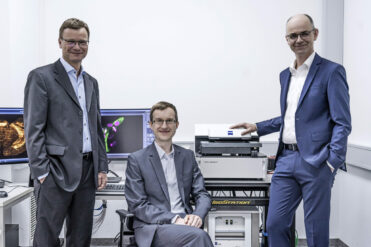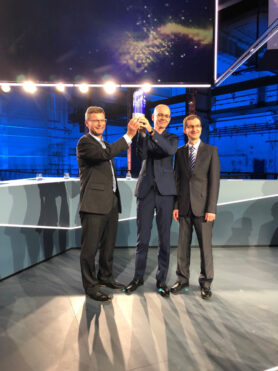News › ZEISS · Microscope Developers Win the German Future Prize 2022
The development of the ZEISS Lattice Lightsheet 7 for gentle 3D imaging of living cells honored with the German President’s Award for Technology and Innovation.

German President Frank-Walter Steinmeier today awarded the ZEISS team the Deutscher Zukunftspreis 2022 in a festive ceremony. In doing so, the jury recognized ZEISS experts Dr. Thomas Kalkbrenner, Dr. Jörg Siebenmorgen and Ralf Wolleschensky for their significant contribution to the development of the ZEISS Lattice Lightsheet 7 microscope system.
»We are delighted to receive the German Future Prize and are very proud of the team behind the extraordinary development performance of the ZEISS Lattice Lightsheet 7,« said Dr. Jochen Peter, Member of the Management Board of the ZEISS Group. »At the same time, the award is a nice confirmation of our company’s innovative strength, which promotes economic and social progress in equal measure.«
With the prize, the German President honors scientists for outstanding technical, engineering and scientific achievements as well as software and algorithm-based achievements that lead to application-ready products. It is endowed with 250,000 euros. In addition to scientific excellence, a clearly recognizable benefit for society, the environment and the economy is also characteristic of the award-winning projects.
On the trail of the living cell
ZEISS Lattice Lightsheet 7 enables biomedical researchers for the first time to observe living cells for hours or days in live and 3D. They can use it, for example, to investigate how cells react to certain active ingredients or what happens when viruses or bacteria penetrate cells. The problem that scientists have previously faced when studying living cells with fluorescence microscopes is the illumination: the intensities of the laser radiation used are a factor of 1000 higher than those of the sun. This intense illumination can cause lasting damage to living cells. A decisive reduction in this photodamage is achieved by so-called light sheet microscopy: unlike all other microscopes, the laser radiation – in the form of a light sheet – is only introduced into the area of the sample that is in the focus of the objective. To do this, the team had to tame the laser in a special way and completely rearrange the objectives as cells grow on coverslips in culture vessels such as Petri dishes and multiwell plates. They developed a completely new type of microscope optics that can be used to look obliquely through sample vessels from below to the cell inside without causing image errors. All of this was developed into an easy-to-use, compact system with high automation potential.

Innovation as part of the corporate identity
ZEISS has been nominated several times for the Deutscher Zukunftspreis, and in 2020 even with two teams. The research team from ZEISS, TRUMPF and Fraunhofer was awarded the German Future Prize 2020 for the development of EUV lithography.
Innovation is a tradition at ZEISS. It is anchored in the company’s DNA, so to speak. As part of the corporate strategy, it is always in the context of society as a whole and at the same time forms the basis for further growth of the ZEISS Group. ZEISS therefore invests thirteen percent of its revenue in research and development work.
Optical technologies are essential for progress in life sciences, medicine, information technology and telecommunications, automotive, consumer and many other areas. Meeting future customer needs with products, services, solutions and business models, offering added value and providing benefits are the concerns of all ZEISS innovations.
